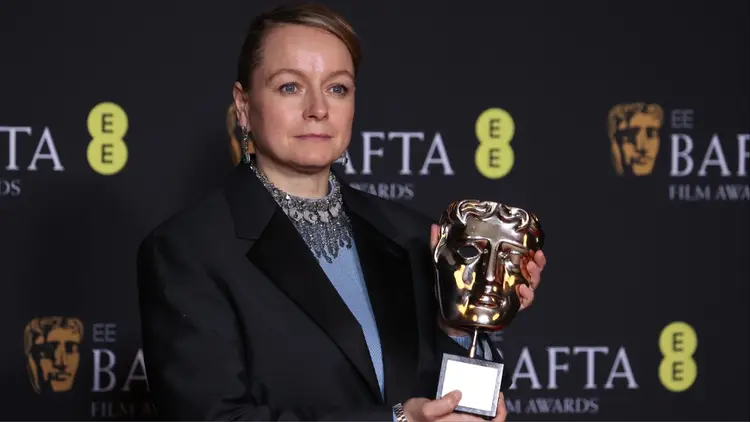BAFTA Winner Samantha Morton Calls for More Investment in British Cinema: ‘We Can’t Just Be a Service Industry for Americans’

Renowned British performer, author, and filmmaker Samantha Morton, who was granted the esteemed title of Fellow at the EE BAFTA Awards on Sunday, has expressed her desire for additional funding to be channeled into English film production.
The accolade is the most prestigious honor presented by BAFTA to a person who has made an outstanding impact in the filmmaking, gaming, or television field.
When Morton spoke to reporters after receiving her award, she emphasized the importance of increasing funding for British cinema. She has been advocating for this for a long time because she believes that the British film industry shouldn't only serve American productions. While she acknowledges the amazing contributions of American filmmakers, she stressed the need for quotas and investments in British cinema, similar to what France has implemented. Currently, the U.K. film and high-end TV industry has received $4.22 billion in inward investment as of 2023, and the majority of that funding came from the United States.
The person in charge of culture, media, and sport in the United Kingdom is the culture minister. According to Morton, it's not wise for the government to only give us a culture and sport minister. This is because the creative arts industry generates a lot of money. It's important for them to understand this. Therefore, we require more investment in schools, education, books, and drama teachers. This is necessary to build a solid foundation for people who want to pursue a career in film, media, TV, and music. It's essential to have strong grassroots support for people to believe that there are opportunities in these fields.
Morton made a significant achievement in her acting career when she starred in Carine Adler's "Under the Skin" in 1997. This performance earned her a BIFA nomination as well as the Boston Film Critics Award for best actress. Additionally, she received recognition from the Oscars for her exceptional acting skills not once, but twice. She was first nominated for best supporting actress due to her role in Woody Allen's "Sweet and Lowdown" in 1999. Later on, in 2003, she was nominated for best actress for her part in Jim Sheridan's "In America."
Morton earned nominations for best actress in the Primetime Emmy Award and BAFTA Television Award, as well as winning a Golden Globe, for her role as child-killer Myra Hindley in “Longford” (2006). Three years later in 2009, she directed her first TV movie, “The Unloved,” which was partially based on her own experiences in the British children’s care system. The film won the BAFTA Television Award for best single drama.
Some of Tilda Swinton's most notable roles in film include her performance in Lynne Ramsay's "Morvern Callar" (2002), for which she received several awards like best performance, Toronto Film Critics Award, and a BIFA for best actress. She also appeared in Steven Spielberg's "Minority Report" (2002), Michael Winterbottom's "Code 46" (2003), Shekhar Kapur's "The Golden Age" (2007), Harmony Korine's "Mister Lonely" (2007), Anton Corbijn's "Control" (2007), earning her a nomination for a supporting actress BAFTA Film Award. Additionally, Tilda Swinton starred in Charlie Kaufman's "Synecdoche, New York" (2008), David Cronenberg's "Cosmopolis" (2012), Andrew Stanton's "John Carter" (2012), Spike Jonze's "Her" (2013), David Yates' "Fantastic Beasts and Where to Find Them" (2016), Darren Aronofsky's "The Whale" (2022) and Maria Schrader's "She Said" (2022).













































